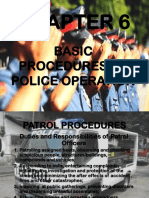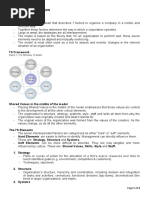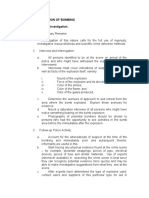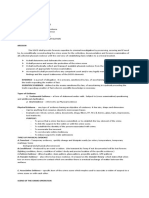0 ratings0% found this document useful (0 votes)
55 viewsOperational Security
Operational security involves taking precautions to maintain secrecy in clandestine activities and protect agent identities. It includes measures to conceal methods, sources, and personnel. While complete secrecy is impossible, efforts aim to achieve a high degree of secrecy. Variables like target sensitivity and opposition level affect security. Elements include surprise, conspiracy, and planning. Principles include keeping missions secret, evaluating risks, blending in normally, and having contingency plans. Compromise is the biggest threat; it can occur through attention-drawing behavior, betrayal, bystanders, or opposition activities. The human element like inability to keep secrets and "double life" fatigue also jeopardize security. Techniques include compartmentalization, cover, concealment, communication controls
Uploaded by
PEMS Ivan Theodore P LopezCopyright
© © All Rights Reserved
Available Formats
Download as DOC, PDF, TXT or read online on Scribd
0 ratings0% found this document useful (0 votes)
55 viewsOperational Security
Operational security involves taking precautions to maintain secrecy in clandestine activities and protect agent identities. It includes measures to conceal methods, sources, and personnel. While complete secrecy is impossible, efforts aim to achieve a high degree of secrecy. Variables like target sensitivity and opposition level affect security. Elements include surprise, conspiracy, and planning. Principles include keeping missions secret, evaluating risks, blending in normally, and having contingency plans. Compromise is the biggest threat; it can occur through attention-drawing behavior, betrayal, bystanders, or opposition activities. The human element like inability to keep secrets and "double life" fatigue also jeopardize security. Techniques include compartmentalization, cover, concealment, communication controls
Uploaded by
PEMS Ivan Theodore P LopezCopyright
© © All Rights Reserved
Available Formats
Download as DOC, PDF, TXT or read online on Scribd
You are on page 1/ 4
OPERATIONAL SECURITY
I. Operational Security Defined
In clandestine activity, the sum total of precautions taken to maintain
the secrecy of the activity and protect the identity of agents constitutes
operational security.
It is composed of measures taken by a project or key officer during the
planning and implementation of clandestine operation in order to conceal or
protect the unit’s methods of operation, sources of information and its own
personnel.
II. Rationale
Intelligence activities will never be able to attain complete secrecy or
security, therefore, efforts must be made to achieve a high degree of secrecy
as much as possible and be able to initiate and maintain operations in spite of
the opposition.
III. Variable Affecting Operational Security
A. Sensitivity of the target or persons involved in the operation
B. Quality and quantity of the persons involved
C. Urgency of the Task
D. The opposition
IV. Elements of Operational Security
A. Element of Surprise
B. Element of Conspiracy
C. Proper Operational Planning
V. Principles of Operational Security
A. Keep the true mission secret
B. Carefully evaluate the risk which must be assumed to
accomplish the mission
C. Consider every factor no matter how minor from the standpoint
of its possible effect on the mission.
D. Maintain the actual appearance of normalty and blend effectively
with the environment.
E. Faithfully subordinate personal desires and feelings and place
emphasis on the accomplishment of the mission.
F. The operational plan must be based upon factual knowledge of
the environment in which the operation will take place.
G. The operational plan must provide a way out of the worst
possible disaster and away from enemy opportunity.
H. The operational plan must be as simple as possible
III. Problems in Operational Security
A. Compromise
The biggest blunder to operational security is being
compromised. Compromise takes place upon disclosure or
identification of intelligence personalities, operations or operational
techniques in such a way as to destroy the effectiveness of the
collection effort.
The common cause of compromise are as follows:
1. When the operations of an intelligence
organization are not covered properly, or its members wittingly
or unwittingly betray themselves by unnatural or unusual
behavior, all these will draw undue attention to itself that can
easily be picked up by the opposition.
2. When a person with knowledge of the intelligence
organization and /or its members decides to give information to
the opposition for revenge, reward or safety.
3. Compromise may be effected passively through an
innocent bystander.
4. Compromise may be effected actively in the
course of routine control activities conducted by the opposition.
In the event of a compromise, the actions to be taken will
depend on the following:
1. The level and type of intelligence operation
2. The mission and target to the intelligence
operation
3. The degree of compromise and the degree of
possible embarrassment to the intelligence organization
An analysis of these factors should guide the actions to be
taken. At times it may be advisable not to take any action, other than
re-emphasize certain security measures. In another case, we might
find it necessary to reorganize a part of our activity; in still another
case, we may have to take more drastic action.
B. The Human Element
In most cases, it is not possible to obtain complete security
even if we apply these principles to the best of our ability. The reason
for this is the human element characterized as follows:
1. The inability to keep secrets
2. Tension resulting from lack of human contact for a period
of time
3. The limited ability of the average human to live a “double
life”
4. The common tendency to do things the easy way
5. The tendency to develop set patterns of activity
6. Fear
7. Physical limitations
8. Limitations in mental ability
How to overcome natural human obstacles
1. Recognize the fact of human limitations and capabilities
and evaluate human weaknesses on an individual basis.
2. Determine to what extent training is capable of reducing
these human weaknesses and limitations.
3. Determine how an individual be use in spite of his
weaknesses.
VI. Operational Security Techniques
A. Compartmentalization
Clandestine activity should be managed in such fashion that
persons involved in one or another component know only what they
need to know about the personnel, organization and activities of any
other component or activity to perform their assigned tasks.
B. Cover
Outward status which a case officer and clandestine
organization of which he is a part adopt to disguise clandestine activity
or achieve clandestine tasks.
C. Concealment
Denies outsiders any view of who or what is being protected.
D. Communication
Properly organized communication enhances security, hence,
communication must be organized in such a manner that it will:
1. Create screen that hides the identity of various members
of the organization under normal operation
2. Provide an effective warning system to the personnel
3. Timely enough to allow for the destruction of
compromising material
4. Timely enough to allow escape and evasion of personnel
E. Cut-Out Device
A cut-out device promotes the avoidance of direct contact
between personnel or units in the intelligence organization which may
help impede investigation by the active opposition by reducing the
opportunity to observe direct contact. A cut-out can be any of the
following:
1. Person
2. Accommodating address
3. Safehouse
4. Letter Drop (Dead/Live)
You might also like
- Masculine Frame Control and Conversational Dominance75% (4)Masculine Frame Control and Conversational Dominance44 pages
- Professional Practice Assignment: HND in Computing (ESOFT Metro Campus)No ratings yetProfessional Practice Assignment: HND in Computing (ESOFT Metro Campus)60 pages
- PLRD1.1.14 - SOP For Planning Suspicious Person, Vehicle or Activities Exercise100% (2)PLRD1.1.14 - SOP For Planning Suspicious Person, Vehicle or Activities Exercise7 pages
- Saudi Arabia Law On Dissemination and Disclosure of Classified Information and Documents (2011/35)No ratings yetSaudi Arabia Law On Dissemination and Disclosure of Classified Information and Documents (2011/35)5 pages
- Intelligence and Secret Service Definition of Terms100% (1)Intelligence and Secret Service Definition of Terms5 pages
- Domestic Realities and Global - Trends 1No ratings yetDomestic Realities and Global - Trends 19 pages
- Police Patrol Operation With Police Communication SystemNo ratings yetPolice Patrol Operation With Police Communication System66 pages
- OPAPP 3rd Quarter Accomplishment ReportNo ratings yetOPAPP 3rd Quarter Accomplishment Report36 pages
- Surveillance Recognition: by U.S. Dept. of StateNo ratings yetSurveillance Recognition: by U.S. Dept. of State5 pages
- INTRO TO COUNTERINTELLIGENCE-updated 01 February 2024No ratings yetINTRO TO COUNTERINTELLIGENCE-updated 01 February 2024178 pages
- The Role of Criminal Intelligence Analysis On TerrorismNo ratings yetThe Role of Criminal Intelligence Analysis On Terrorism7 pages
- Module-In-Lea-3-Finals 4 Industrial Security ConceptNo ratings yetModule-In-Lea-3-Finals 4 Industrial Security Concept12 pages
- Post - Test Examination (Items 1 To 100)No ratings yetPost - Test Examination (Items 1 To 100)8 pages
- 12-12-2020 Intensification of Security MeasuresNo ratings yet12-12-2020 Intensification of Security Measures3 pages
- Internet Infrastructure Security Guidelines For AfricaNo ratings yetInternet Infrastructure Security Guidelines For Africa32 pages
- 5487 Private Security 5487 Private Security Private SecurityNo ratings yet5487 Private Security 5487 Private Security Private Security4 pages
- Presentation About Investigation Relating To Explosive and Explosions100% (1)Presentation About Investigation Relating To Explosive and Explosions55 pages
- Tirado-Acosta v. National Guard, 1st Cir. (1997)No ratings yetTirado-Acosta v. National Guard, 1st Cir. (1997)31 pages
- Military Science 31: Personnel SecurityNo ratings yetMilitary Science 31: Personnel Security14 pages
- Perspective Strength Weaknesses Opportunities Threat: Swot AnalysisNo ratings yetPerspective Strength Weaknesses Opportunities Threat: Swot Analysis10 pages
- Small Unit Supervision (McKinsey 7S Model)No ratings yetSmall Unit Supervision (McKinsey 7S Model)4 pages
- Illegitimate Children Are Entitled To Financial SupportNo ratings yetIllegitimate Children Are Entitled To Financial Support4 pages
- Contents: Culture and Society I. Learning ObjectivesNo ratings yetContents: Culture and Society I. Learning Objectives3 pages
- Grade 4 DLL Quarter 3 Week 7 (Sir Bien Cruz)No ratings yetGrade 4 DLL Quarter 3 Week 7 (Sir Bien Cruz)30 pages
- Devoir de Synthèse N°1 - Anglais - 3ème Lettres (2019-2020) Mme Besma Riabi DziriNo ratings yetDevoir de Synthèse N°1 - Anglais - 3ème Lettres (2019-2020) Mme Besma Riabi Dziri4 pages
- University of Bisha Ministry of Higher Education Kingdom of Saudi Arabia Leadership and Management in Nursing Seminar Presentation ONNo ratings yetUniversity of Bisha Ministry of Higher Education Kingdom of Saudi Arabia Leadership and Management in Nursing Seminar Presentation ON19 pages
- Don't: Don't:: Sprinkler of Emotions Cooling Off Period Calm & Rational Period 1No ratings yetDon't: Don't:: Sprinkler of Emotions Cooling Off Period Calm & Rational Period 11 page
- pc101 Application Activity BasicparagraphNo ratings yetpc101 Application Activity Basicparagraph2 pages
- Introduction To IC in Business PoliticsNo ratings yetIntroduction To IC in Business Politics24 pages
- Symbiotics - Advanced Air Mobility Pre-Selection AssessmentsNo ratings yetSymbiotics - Advanced Air Mobility Pre-Selection Assessments14 pages
- Lesson 8: The Material/Econo MIC Self: Group 8 Bs Crim 1 YA-1No ratings yetLesson 8: The Material/Econo MIC Self: Group 8 Bs Crim 1 YA-117 pages
- If Clause or The Conditional 2023-2024 DR LAHMER MNo ratings yetIf Clause or The Conditional 2023-2024 DR LAHMER M8 pages
- Memory:: 1. Immediate Memory (Sensory Memory)No ratings yetMemory:: 1. Immediate Memory (Sensory Memory)2 pages
- Masculine Frame Control and Conversational DominanceMasculine Frame Control and Conversational Dominance
- Professional Practice Assignment: HND in Computing (ESOFT Metro Campus)Professional Practice Assignment: HND in Computing (ESOFT Metro Campus)
- PLRD1.1.14 - SOP For Planning Suspicious Person, Vehicle or Activities ExercisePLRD1.1.14 - SOP For Planning Suspicious Person, Vehicle or Activities Exercise
- Saudi Arabia Law On Dissemination and Disclosure of Classified Information and Documents (2011/35)Saudi Arabia Law On Dissemination and Disclosure of Classified Information and Documents (2011/35)
- A School Security Officer: What Makes a Good One?From EverandA School Security Officer: What Makes a Good One?
- Intelligence and Secret Service Definition of TermsIntelligence and Secret Service Definition of Terms
- Police Patrol Operation With Police Communication SystemPolice Patrol Operation With Police Communication System
- INTRO TO COUNTERINTELLIGENCE-updated 01 February 2024INTRO TO COUNTERINTELLIGENCE-updated 01 February 2024
- The Role of Criminal Intelligence Analysis On TerrorismThe Role of Criminal Intelligence Analysis On Terrorism
- Module-In-Lea-3-Finals 4 Industrial Security ConceptModule-In-Lea-3-Finals 4 Industrial Security Concept
- Internet Infrastructure Security Guidelines For AfricaInternet Infrastructure Security Guidelines For Africa
- 5487 Private Security 5487 Private Security Private Security5487 Private Security 5487 Private Security Private Security
- Presentation About Investigation Relating To Explosive and ExplosionsPresentation About Investigation Relating To Explosive and Explosions
- Perspective Strength Weaknesses Opportunities Threat: Swot AnalysisPerspective Strength Weaknesses Opportunities Threat: Swot Analysis
- Tough Mark: Domestic Terrorism On Our StreetsFrom EverandTough Mark: Domestic Terrorism On Our Streets
- Illegitimate Children Are Entitled To Financial SupportIllegitimate Children Are Entitled To Financial Support
- Contents: Culture and Society I. Learning ObjectivesContents: Culture and Society I. Learning Objectives
- Devoir de Synthèse N°1 - Anglais - 3ème Lettres (2019-2020) Mme Besma Riabi DziriDevoir de Synthèse N°1 - Anglais - 3ème Lettres (2019-2020) Mme Besma Riabi Dziri
- University of Bisha Ministry of Higher Education Kingdom of Saudi Arabia Leadership and Management in Nursing Seminar Presentation ONUniversity of Bisha Ministry of Higher Education Kingdom of Saudi Arabia Leadership and Management in Nursing Seminar Presentation ON
- Don't: Don't:: Sprinkler of Emotions Cooling Off Period Calm & Rational Period 1Don't: Don't:: Sprinkler of Emotions Cooling Off Period Calm & Rational Period 1
- Symbiotics - Advanced Air Mobility Pre-Selection AssessmentsSymbiotics - Advanced Air Mobility Pre-Selection Assessments
- Lesson 8: The Material/Econo MIC Self: Group 8 Bs Crim 1 YA-1Lesson 8: The Material/Econo MIC Self: Group 8 Bs Crim 1 YA-1
- If Clause or The Conditional 2023-2024 DR LAHMER MIf Clause or The Conditional 2023-2024 DR LAHMER M























































































































